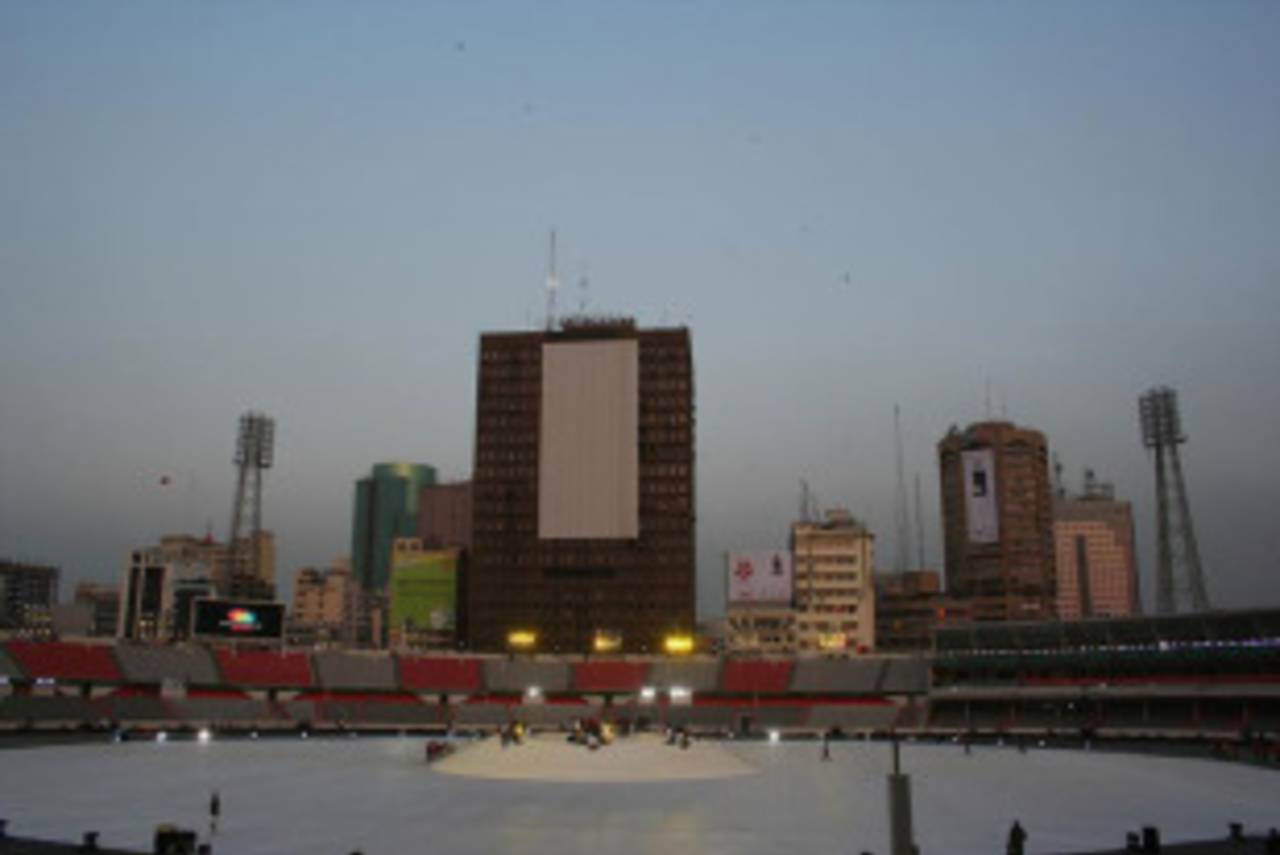Bangladesh waiting to exult
At the first notes emerging from the iconic Bangabandhu National Stadium on Thursday evening, a young nation will pause for a moment to reflect on just what it has achieved
Mohammad Isam
17-Feb-2011

A view of the Bangabandhu National Stadium at twilight • ESPNcricinfo Ltd
At the first notes emerging from the iconic Bangabandhu National Stadium on Thursday evening, a young nation will pause for a moment to reflect on just what it has achieved. Little more than a decade after being admitted to cricket's top table, Bangladesh is hosting the opening ceremony - and, two days later, the opening game - of the sport's biggest event. It's a time of celebration - and there's plenty of it going round - but it's also an opportunity to remember the hundreds of players and administrators who lost out to politics in the quarter century between Partition and Independence.
"This means the world to the people, to put it simply," Saber Hossain Chowdhury, a Member of Parliament, said. Chowdhury was president of the Bangladesh Cricket Board when the national team won the ICC Trophy - its biggest success so far on the field. "This is the best dream, this event is what every citizen of this country has been waiting for. Cricket brings the country together.
"When we took over in 1996, our target was to try and achieve the Test status and then set in motion the process of bringing the World Cup to Bangladesh, host the opening ceremony. People thought it was a pipedream."
Well, that dream has now come true, and the signs are everywhere. Business is booming, especially in the hospitality sector, with the expected influx of tourists and expats leading to hotel rooms - especially for Bangladesh's games against India in Dhaka, and England in Chittagong - being sold out months in advance. Analysts expect around $10-15 million as additional income during the tournament; it could have been more had things been better planned but few new hotels were built, or attractive packages designed by travel companies. No such worries for the restaurants around the two host cities' stadiums though, or cricket gear manufacturers, who are rushing to meet huge demands.
It's boomtime for the media, too. The Daily Star and Samakal both brought out special-edition magazines, the largest-selling Prothom Alo and its competitor Kaler Kantha have started broadsheet supplements and the highlight on TV is a daily show hosted by former captain Habibul Bashar.
But the biggest attractions have been the decorations in around the city - especially in Dhaka's suburb of Mirpur, where the matches will be played. Lights from Singapore have been installed to create one of the most dazzling displays the city has ever seen, drawing in Dhakaites late into the night. It could be argued, of course, that the "beautification" drive has been taken too far - the reports of beggars and old buses being taken off the streets, and of people being asked not to air their dirty linen in public (literally!) sound ludicrous but the intention is good.
It's almost as amazing as the story of Bangladesh cricket itself, a sport that till little more than a decade ago was second in popularity to football. It took that ICC Trophy win in 1997, after a disastrous campaign in which they failed to qualify for the 1996 World Cup on the subcontinent, to change the paradigm.
Senior sports journalist Arifur Rahman, who was in Kuala Lumpur to witness that triumph in 1997, says the World Cup is a natural conclusion to the country's passion for the game. "They say cricket is religion in India but is it too far away in Bangladesh? It is part of the people's daily life and for the country itself, hosting the World Cup is the biggest triumph. This time takes me back to those moments in April 1997."
The arrival of the World Cup gives the fans - Bangladesh cricket's most precious asset - a reason to cheer, a happy interlude from the usual litany of calamities cricketing and otherwise. One man who has seen it all - the 1989 Nehru Cup, 1999 World Cup or the annual derby games between Dhaka's two big clubs Abahani and Mohammedan Sporting - is Kazi Zahurul Qayyum, possibly the country's most famous cricket tragic. A businessman in the aviation sector, he's travelled extensively with the national team despite having no links with the BCB. His abiding memory is of the 1997 ICC triumph. "I went there to support the team, knowing that there wouldn't be a guarantee of going through," he said. Count on him being present at every Bangladesh game during the World Cup.
As the country braces itself… hang on, this is the phrase we use when there's a cyclone alert. The line here should be: The people of this country have, after a long time, felt a strong connect with each other. They've held their breath for the longest time; now they're waiting to exhale - and exult.
Mohammad Isam is Senior Sports Reporter, The Daily Star in Dhaka